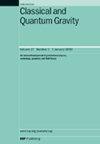Arm-locking frequency noise suppression for astrodynamical middle-frequency interferometric gravitational wave observatory
IF 3.6
3区 物理与天体物理
Q2 ASTRONOMY & ASTROPHYSICS
引用次数: 0
Abstract
For space gravitational wave detection, arm locking is a proposal useful in decreasing the frequency noise of the laser sources for current developing space missions Laser Interferometer Space Antenna (LISA) and Taiji/TianQin. In this paper, we study the application of arm locking to the Astrodynamical Middle-frequency Interferometric Gravitational wave Observatory (AMIGO) to decrease the frequency noise of laser sources. For AMIGO, the arm-locking technique can suppress the laser frequency noise by three orders of magnitude. The advantage of this is to make the auxiliary noise assignment for AMIGO easier and more relaxed. For the first-generation time-delay interferometry (TDI) configuration, the laser frequency noise contribution is already below the core noise contribution. For the simple Michelson TDI configuration (X0), the arm locking makes the acceleration-thrust scheme, the delay-line scheme, or the combined scheme easier to implement. Within a relatively short period of less than a day (compared to less than twenty days for LISA/Taiji), the Doppler frequency pulling can be efficiently reduced to within ±0.001 Hz and does not affect the mission duty cycle much.用于天体动力学中频干涉引力波观测台的臂锁频率噪声抑制装置
在空间引力波探测方面,臂锁是一项有用的建议,可降低目前正在开发的空间任务激光干涉仪空间天线(LISA)和太极/天琴的激光源的频率噪声。在本文中,我们研究了臂锁定在天文中频干涉引力波观测台(AMIGO)中的应用,以降低激光源的频率噪声。对于 AMIGO,臂锁技术可以将激光频率噪声抑制三个数量级。这样做的好处是使 AMIGO 的辅助噪声分配变得更容易、更轻松。对于第一代延时干涉测量(TDI)配置,激光频率噪声的贡献已经低于核心噪声的贡献。对于简单的迈克尔逊 TDI 配置(X0),机械臂锁定使得加速-推力方案、延迟线方案或组合方案更容易实施。在不到一天的较短时间内(相比之下,LISA/Taiji 的时间不到 20 天),多普勒频率偏差可以有效地降低到 ±0.001 Hz 以内,并且不会对任务的工作周期造成太大影响。
本文章由计算机程序翻译,如有差异,请以英文原文为准。
求助全文
约1分钟内获得全文
求助全文
来源期刊

Classical and Quantum Gravity
物理-天文与天体物理
CiteScore
7.00
自引率
8.60%
发文量
301
审稿时长
2-4 weeks
期刊介绍:
Classical and Quantum Gravity is an established journal for physicists, mathematicians and cosmologists in the fields of gravitation and the theory of spacetime. The journal is now the acknowledged world leader in classical relativity and all areas of quantum gravity.
 求助内容:
求助内容: 应助结果提醒方式:
应助结果提醒方式:


